Two years ago today, my TEDx talk on the skill of humor was uploaded to the TEDx YouTube Channel. To say it has changed my life is both an exaggeration and an understatement. It’s an exaggeration because regardless of how it was received, I would have continued on my mission to make the world funnier so that it may be effective-r. And it’s an understatement because I could not have predicted what would happen once the video went live.
To celebrate the two year anniversary, I decided to take a look at why humor is an idea worth spreading through the lens of what’s happened with the video. I already believed humor had the ability to create change, that’s why I gave the talk and what we’ve been working on for the last ten years at Humor That Works, but I wanted to look at the impact the TEDx talk has had, not on me, but on other people around the world. (To see a personal look at the experience, you can see last year’s post on The Process of Giving a TEDx Talk.)
The YouTube Video
The easiest place to start is with the YouTube video itself. After all, that’s where the viewing happens (unless you’re big into pirating already free TEDx videos). As of the writing of these words (June 12, 2019), the video has 4,702,914 views, 89,637 likes, 2,351 dislikes, and 2,256 comments.
For a little context, 136,389 talks have been uploaded to the TEDx YouTube channel, with the skill of humor currently being the 76th most viewed talk (top 0.6%). But that comes with an important caveat: some TEDx talks are also elevated to the TED brand.
For example, Thomas Suarez’s talk on app development has 3 million views on the TEDx YouTube Channel, good for #134. But his talk is also on the TED YouTube Channel with 6.8 million views and the TED website with another 9 million, so the TEDx channel ranking comes with a grain of salt. Still, 4.7 million views suggests that perhaps there’s something to the idea of humor.
I also think it’s fair to say that the talk has been well-received. The percentage of likes (89,637) to dislikes (2,351) is at 97.44%, comparable to the top five talks on TEDx. The percentage of likes compared to the overall number of views is also the highest (1.91%) among the most viewed.

That same table shows that the engagement on the skill of humor–in this case the number of comments compared to the number of views–is also pretty solid and is on-par with the top five as well (0.05%). If we believe these other talks to be worth sharing, numerically the skill of humor belongs there as well.
Of course, if an idea is worth spreading, it should actually be spread to others. Unfortunately I don’t have access to the YouTube analytics for the talk so I can’t give exact numbers, but some Google searching shows that the video has indeed been shared. It has been embedded on a number of websites (including the World Economic Forum), discussed on podcasts, included in lists of TEDx talks to watch, and posted on most forms of social media, including nearly 5,000 shares on Facebook:

This suggests the idea has spread, though I am still waiting for it to get popular on MySpace and Google+ to confirm its legitimacy.
The YouTube Comments
While views are a great metric to follow (and fantastic for the ego), they don’t tell the whole story. Another interesting place to explore is the YouTube comments. People are often wary of exploring the depths of YouTube comments as they can be a harrowing place, but I’ve found most of the comments on the talk encouraging, enlightening, and/or hilarious.
The comments range from positive compliments about the talk to utter disbelief that so many people could possibly enjoy this “unfunny, waste of time.” There’s also a subset of comments dedicated to additional celebrities I’m similar to (including Neil Patrick Harris, Chandler Bing, and SpongeBob SquarePants).
Of the 2,256 comments, the most popular one (by likes) is:

A true compliment in the days of internet to be sure. The most popular comment (by replies) is:

Not to be outdone, a number of the replies are additional math pickup lines, including this great combo of math puns:

Of the positive comments, there are people praising the talk and sharing how it’s helped them broaden their perspective:

There are those who said it spoke to them:

Side note: I’m not sure even my mom would watch the talk five times on repeat, so I appreciate the support Raul.
And there were others who were very enthusiastic (i.e. ALL CAPS) in their praise:

The neutral comments consists of quotes from the talk:

Lots of love for my grandma (and rightfully so):

And some pretty hilarious digs at me:


And my personal favorite:

The negative comments are mostly about how unfunny I am:

Though luckily I do have some supporters defending me:

Thank you for the backup, Jack ;).
In fact, you can see a parallel between some of the positive comments and some of the negative:

Going through the comments helped me realize something important: my ego wants to be liked by everyone, to be heralded as a hilarious person by all humans, get elevated to TED.com, and maybe even have a Netflix humor special someday. While the last two desires are tangible goals that may one day come true, the first two are impossible.
By looking at the comments on what, by many metrics, is a “successful” talk, I realized my goal is not to please everyone because I can’t. If you have an idea worth spreading, some people are going to be against it, or going to be against your way of doing it, no matter what you say or do.
Instead, my goal is to provide value to the people who resonate with my message. Every ounce of energy I devote to the haters is an ounce of energy I could have been using to serve the believers (even the ones that think I’m just pretty okay).
The Direct Messages
All of the stats above speak to a quantified look at why the skill of humor is an idea worth spreading, or rather, how it has spread. But the biggest indicator that humor is worth spreading comes from the messages I’ve received since the talk came out–the emails, DMs, and in-person conversations I’ve had with folks who felt compelled to reach out because of a 19-minute video on the internet.
That people would take the time to seek me out, write a message, and hit send, is incredibly humbling to me. I’ve never watched a video on YouTube and then taken the time to contact the person who created it (though I am going to start). The willingness to reach out speaks to their willingness to express gratitude, the impact of the talk, or more likely, a combination of the two.
Over the last two years, I’ve received 256 messages via email and social media that directly quote the TEDx talk as their reason for reaching out. That’s just 0.005% of the number of views the talk has received, but it is an average of more than one message every three days.
And the messages have come from all range of services:
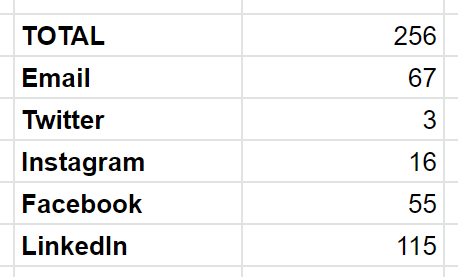
I’ve yet to receive a shout out via messenger pigeon or smoke signal, but I am holding out hope.
And they’ve come from all over the world, representing 44 countries, 28 states, and six continents (what’s going on Antarctica?!?):

The fact that messages have come from around the globe speaks to the fact that humor is a universal value, something that isn’t specific to one region or type of person, but rather is a fundamental human experience. And that we live in a cool time where the world is more connected.
A majority (58%) of the 200+ messages were just quick shout outs and thank yous to say how they enjoyed the talk:
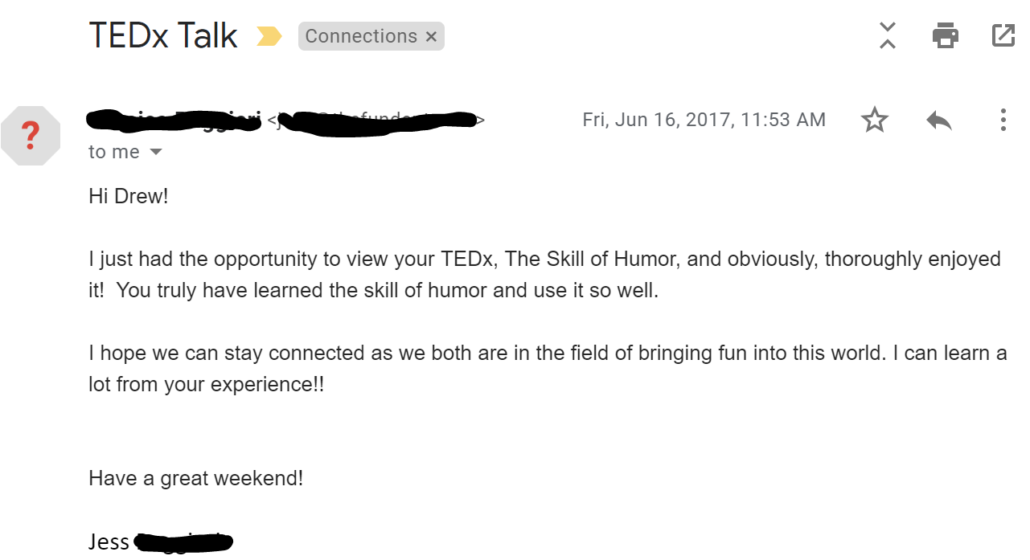
How they needed some good humor:

Or how it’s prompted more humor:
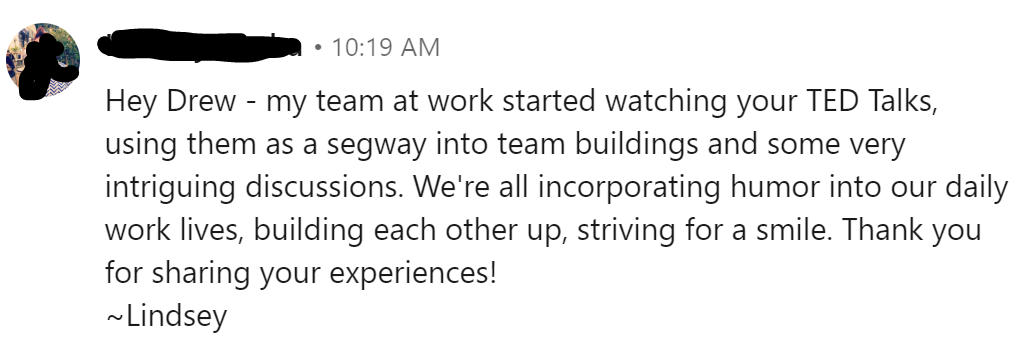
Some of the messages were words of encouragement for my self-proclaimed nerdery:

And offers to partake in nerdy activities:

The answer is yes, I’m always down for D&D (unless it’s Season 8 of Game of Thrones).
The Events
There were two other types of messages that further suggest there is value in spreading the idea of humor. The first were inquiries about my work, including one from a surprising source:

39 of the 256 messages I received were like the one above, asking me to come speak to an organization. Another 12 were to be on a podcast. I really enjoy seeing these types of messages because I’m passionate about what I do and love any opportunity to talk about the value of humor in our work and lives.
But moreso (or maybe equally so), requesting a talk or interview is direct evidence that the idea is worth spreading because it’s literally asking me to spread the message. It means that event organizers and podcast hosts saw the talk and thought, “I want my audience to hear this message.”
Those 39 inquiries have led to 18 events in three countries, plus four more coming up within the next year and four more that are still being discussed. It’s resulted in me sharing the message of humor in front of ~5,000 people live.
It’s also generated 12 appearances on podcasts ranging in topic from sales to training to work-life balance. If you add in an estimated number of listens from podcasts I was a guest on, along with the views from videos that were posted from the aforementioned events, my best guess for total people impacted from extensions of the TEDx talk is ~50,000. That’s a drop in the bucket compared to the 4.7 million views on the talk itself, but evidence that the idea is spreading.
But there is one last type of message I want to explore further, one that truly speaks to what has happened since the video went live.
The Impact
Everything written above has been fun to explore. Doing a deep dive into the statistics of the YouTube video, exploring the comments, analyzing the messages, and thinking about the additional events the talk has led to all touch on the value of humor (and is perhaps a tiny bit vain).
But the greatest indicator that the skill of humor is an idea worth spreading comes from one last category of messages I’ve received.
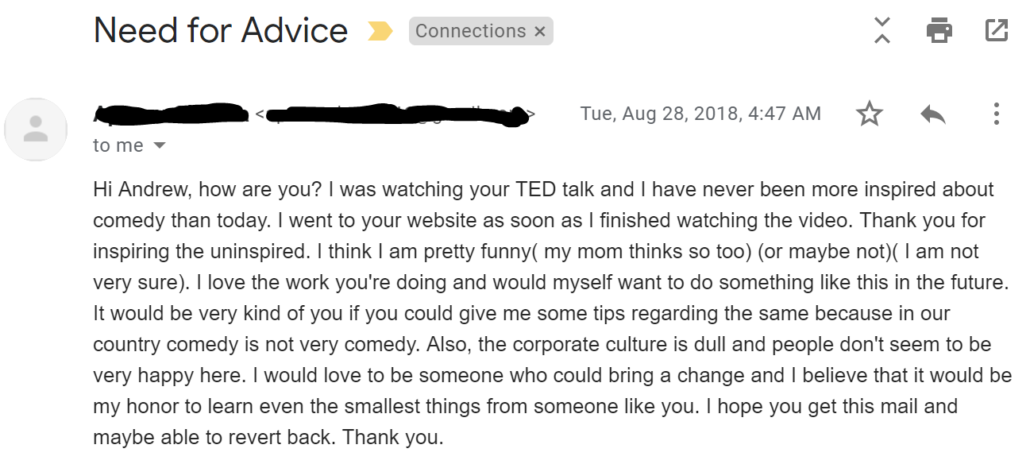
They are the messages from people talking about how they’ve been inspired by the talk. Or how they’re going to make a change:

I’ve received notes about how it’s provided them encouragement:
And that it’s given them inspiration:

Or motivation:

For others, they felt a sense of validation:

Or that it helped them in some way:

Side Note: It is never a bother to hear from someone who reaches out; I respond to every single one of these messages.
To hear from people how you have positively impacted them is one of the greatest gifts you can receive. It puts into perspective why you do what you do and justifies the (metaphorical) blood, (figurative) sweat, and (occasionally literal) tears that go into it. But people don’t send these messages because of me, they send them because of the idea, the value and power of humor that is so desperately needed, and too often forgotten, in today’s world.
Perhaps the best articulation of this comes from an email I received from a former coaching client after the talk came out:
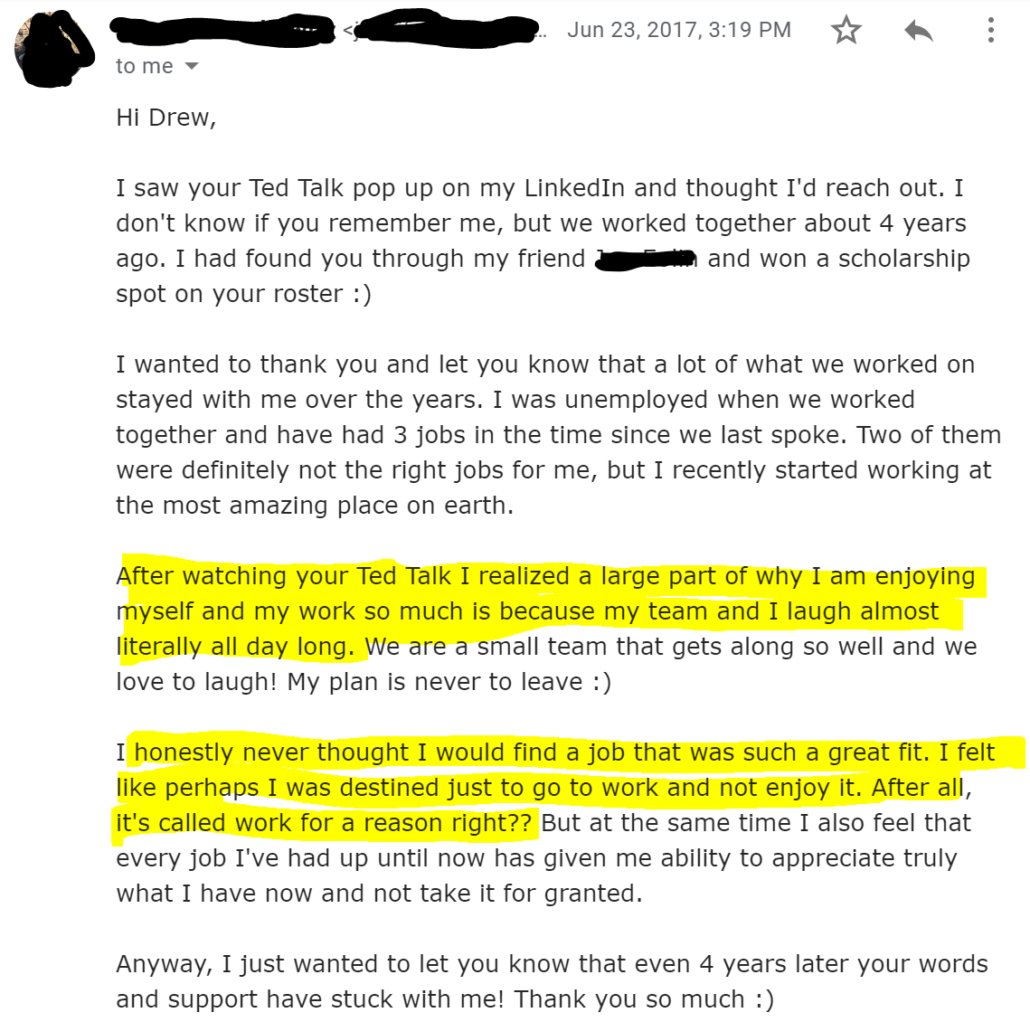
So many people assume that work has to feel like “work.” That it’s something you have to do just to survive. But what if, by using the skill of humor, we could enjoy not just our work but all parts of our lives a little bit more. What if we could better connect with the humans around us and better manage the ups and downs of daily life? What if we could all be a little funnier and have a lot more fun? To me, and quite a few others, that is an idea worth spreading.
If you haven’t watched the talk yet, you can do that here: the skill of humor. If you want to learn more about humor, check our site at Humor That Works or pick up the Humor That Works Book.

Great article Drew! I liked how you combined information, human experience, and your own work. I look forward to learning more about Humor at Work as I really believe we have the potential for so much more joy and effectiveness. Thank you for what you do!!!